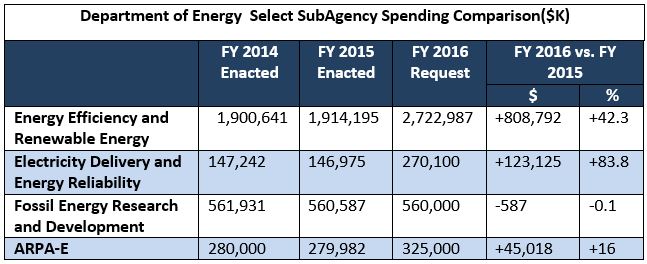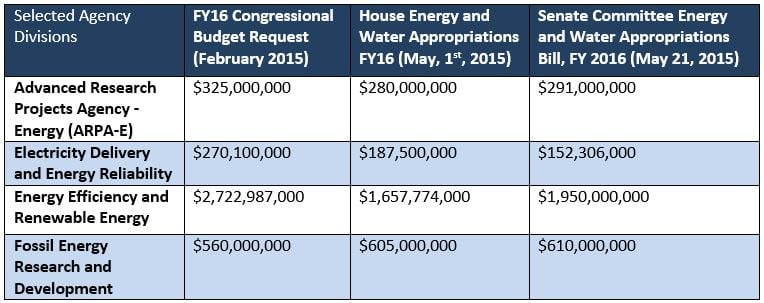Department of Energy Funding Update for FY 2016
The President’s Fiscal Year (FY) 2016 Budget provides $30 billion to support the Department of Energy in the areas of nuclear security, clean energy, environmental cleanup, climate change response, science, and innovation. While the budget request is far from final, it does signal the President’s and the Department’s priorities. These requests include over $1.2 billion in crosscutting research and development across six Secretarial initiatives focusing on electric grid modernization, subsurface science and engineering, supercritical CO2 in electric power generation, the water-energy nexus, exascale computing, and cybersecurity.
As of this writing of this blog post, however, both the House Appropriations bill and the Senate Appropriations Committee’s bill have expressed markedly different priorities for DOE.
The Senate spending bill would cut the DOE’s Office of Energy Efficiency and Renewable Energy (EERE) funding 29 percent below President Obama's request, down to $790 million. Funding for wind energy research is 68 percent less than what the president requested and the Advanced Research Projects Agency-Energy, at $291 million, 10 percent less than Obama's request. Both Democrats and Republicans held back potentially controversial amendments that would have endangered passage by the full Senate.
Instead, the bill prioritizes fossil fuel and nuclear energy research. It includes $6 billion for nuclear waste management, $167 million above current funding. Fossil fuel research would get $610 million, a $39 million increase, and nuclear energy research would get $950 million, a $116 million increase. It also would increase basic research funding to $5.1 billion, the highest level ever.
While it is ultimately impossible to predict what levels of DOE funding will ultimately be enacted, it is worth noting that Congress has relied heavily on temporary Continuing Resolutions and Omnibus spending bills in recent years to keep the government funded and operating. Ultimately, the DOE’s FY16 funding is likely to be determined in a year-end showdown between the Republican-controlled Congress and the Democratic President.


